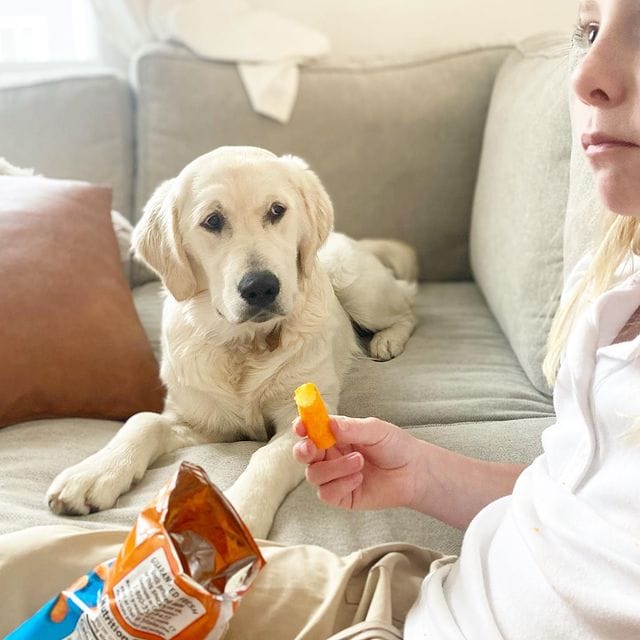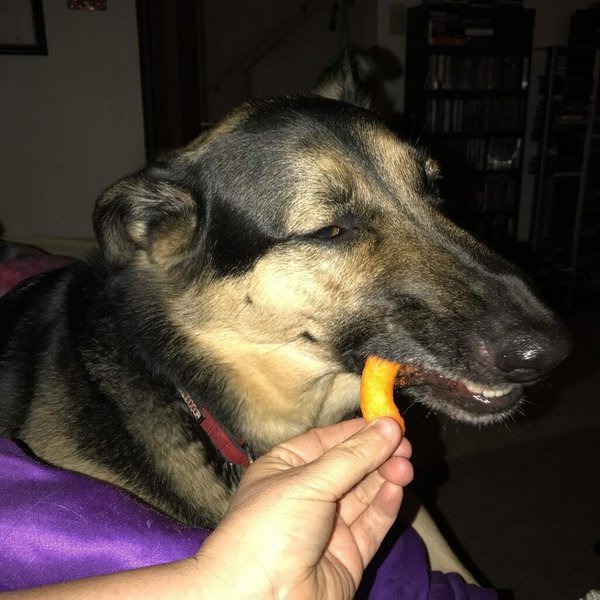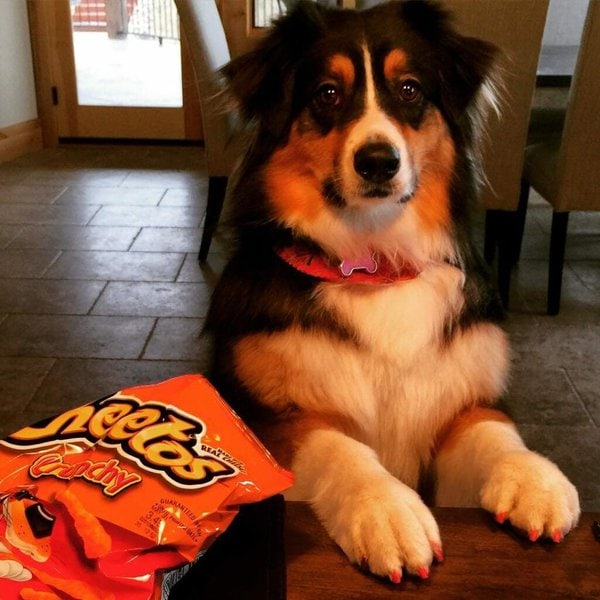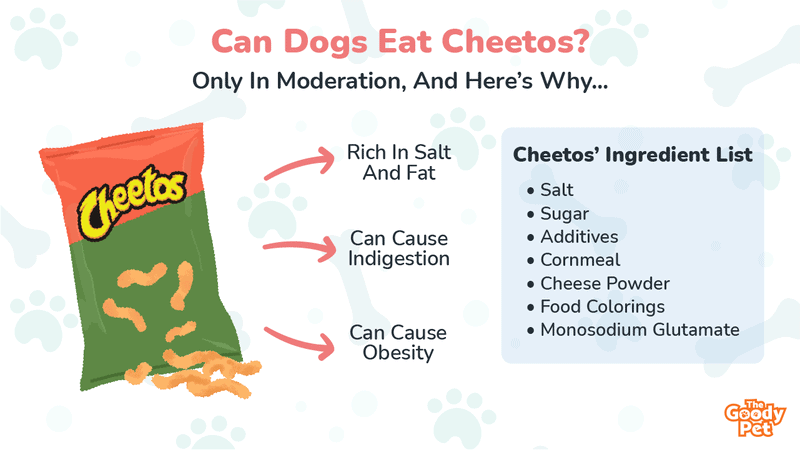Who does not love Cheetos? It’s so hard to resist the cheesy and crispy texture of Cheetos that begins with a crackling noise followed by an irresistible layer of salt, the delicious taste of the cheese, and then the buttery and rich fat that melts in your tongue.
With each bite of Cheetos, it is as if you are instantly rewarded with pleasure, making it very hard to stop munching on. The problem begins when your pooch also wants to delight itself with Cheetos. Should you give in to the begging?
Yes, your dog can enjoy Cheetos but only in moderation. A piece of Cheetos or two each week is sufficient, and they should not be ones flavored with spices like chili peppers. If given as regular treats, the ingredients of Cheetos, like cornmeal and salt, could lead to health concerns like diabetes and obesity.
So, allow your pooch to enjoy the taste of Cheetos but only in moderation. Today, we’d learn how Cheetos can be harmful to your dog, what is the safe amount, and what you should do in case your pooch over ate Cheetos.
Can My Dog Eat Cheetos?

Yes, you can share a bit of your Cheetos with your dog. Your pooch will surely love the taste, the smell, and the crunchy texture of Cheetos.
Again, moderation is the word to remember. Generally, 1 to 2 pieces of Cheetos once a week is enough to satisfy your dog’s cravings.
But, of course, the size of your dog matters. The larger your dog, the more Cheetos it can eat before it becomes a health problem.
Be mindful that Cheetos are not exceptionally nutritious; instead, these only provide empty calories to your dog. We’d also like to add that, unlike the spicy-flavored Cheetos, the plain and original-flavored Cheetos may not seriously hurt your dog if given in the right proportion.
However, it does not mean that the plain and original-flavored Cheetos can be part of your dog’s daily diet.
To understand why Cheetos should only be given in moderation, looking at the ingredients is the best place to start.
The Ingredients Of Cheetos
We all know that Cheetos fall under the category of junk food for humans, meaning that this type of snack does not give us any nutritional benefits. Rather, Cheetos are generally enjoyed solely because of their taste.
Listed below are the main ingredients of Cheetos; many of them are not suitable if eaten in large amounts by our dogs:
Cornmeal
Similar to the other types of cheese-flavored junk food, cornmeal is the main ingredient used in Cheetos.
Cornmeal is not only unhealthy but is also densely packed with calories. And, since corn is not considered a staple in a dog’s diet, some of them have a problem digesting cornmeal.
Apart from cornmeal, Cheetos are covered with monosodium glutamate (MSG) and cheese powder to achieve that rich cheesy flavor that we all love.
All these three ingredients are not particularly ideal for your dog’s health and only add up to its weight. Thus, it’s okay to give Cheetos but in small amounts only.
Sugar And Dietary Fibers
Cheetos are also made with artificial flavors and additives, both of which shouldn’t be part of your dog’s healthy meal plan.
In fact, the healthy dog food in the market today contains very little amount of seasonings like sugar because strong flavors are not recommended for dogs.
That said, Cheetos in moderation is what we advise.
Salt And Food Colorings
Did you know that an average bag of Cheetos contains 270 mg of sodium? Now, that’s a lot of salt for your dog, considering that the safe amount should only be 13.3 mg for every pound of body weight.
In addition, the food coloring makes up for another non-healthy ingredient for your pooch to consume in large amounts.
You may now be asking, “having said that Cheetos is generally safe if given in moderation, what varieties of Cheetos should I give to my dog?” We encourage you to continue reading to find out more.
Can My Dog Eat All Varieties Of Cheetos?

No, not all varieties of Cheetos are safe for your dog. The Flamin’ Hot, Flamin’ Hot Limon, and Jalapeño Cheetos are not considered to be safe treats for your dog.
These three varieties contain additional ingredients like garlic and onion powders which can potentially hurt your dog.
In addition, similar to humans, the hot spices can possibly irritate the mouth and gums of your pooch if it licks on hot Cheetos varieties.
Can My Dog Eat Cheetos Cheese And Bacon Balls?
Refrain from feeding your dog with this Cheetos variety. Unlike the regular variety, the Cheetos Cheese and Bacon Balls contain paprika.
Eating snacks with paprika can cause your pooch to suffer from gastrointestinal distress. Not to forget that the dusty texture of paprika can easily get in the air, causing your pooch to inhale it or get into the eyes.
Can My Dog Eat Baked Cheetos?
Though the packaging states that baked Cheetos is 50% less fat, still, Baked Cheetos have high levels of carbohydrates.
As mentioned earlier, Cheetos is primarily made from cornmeal, an ingredient that’s high in carbs. Unlike us, our dogs only need a little percentage of carbohydrates in their daily diet.
Plus, the baked ones are also sprayed with vegetable oil. Thus, feed your pooch sparingly with Cheetos, even the baked variety.
Can Cheetos Make My Dog Sick?
Yes, spoiling your dog with Cheetos can make it sick.
Again, a few pieces won’t spell any difference, but anything above the recommended amount could lead to health issues such as the following:
Allergic Reactions
One of the common complaints of fur parents is skin allergies as a result of a bad diet. Cheetos, regardless of flavor, contain common allergens to dogs like cornmeal and lactic acid.
Don’t be surprised then if, after a few days of indulging in Cheetos, you’d see skin discoloration, excessive scratching, excessive licking, and rubbing its face across on the sofa or across the floor.
Hypernatremia
An overdose of salt can possibly lead to a condition known as hypernatremia. This happens when there is an increased level of sodium in the blood.
The effects of this condition are vomiting, dehydration, fatigue, and in the worst scenario, seizure. In case your pooch is diagnosed with this condition, it may require an emergency vet intervention.

Loss Of Appetite
Cheetos are loaded with carbs and empty calories that provide your dog the feeling of fullness. So, if your pooch’s stomach has already been filled with Cheetos, naturally, it will lose its appetite to eat its daily and healthy meals.
Moreover, eating too much Cheetos also risks your dog from dyspepsia or indigestion. This condition results from eating a lot of food or eating the wrong type of food like Cheetos.
Lack of appetite, excessive drooling, and having bad breath are some of the common signs of dyspepsia.
Dehydration
Dehydration is a fatal condition that can result in death. A seemingly harmless Cheetos, if given in large amounts, can make your dog dehydrated.
This is especially true if your pooch had a feast on the hot varieties that contain higher amounts of salt, garlic, and onion powders.
What happens is if the blood is bombarded with excessive food spices, the tendency is for the kidneys to flush out these toxins through urination. The higher the salt concentration in the blood, the more urination. The result of this is dehydration.
Obesity And Diabetes
Due to the high fat and sodium contents of Cheetos, regularly giving these as treats leads to rapid weight gain. Not to forget that Cheetos also have sugar content. Obesity plus increased sugar intake equates to diabetes.
Should I Worry If My Dog Ate Cheetos?
Don’t run to the vet clinic right away if you catch your pooch munching on Cheetos. If it just ate a few pieces, in all likelihood, it would be fine. A little tummy distress won’t require an emergency trip to the clinic.
The story is different if your dog ate the entire bag of Cheetos. Observe your pooch for persistent and worsening signs of intestinal problems like vomiting and diarrhea.
Watch out for signs of anemia like loss of appetite and lethargy, as this definitely warrants a trip to the vet clinic. This is because the signs of garlic and onion poisoning usually manifest a few days after eating hot Cheetos varieties.






